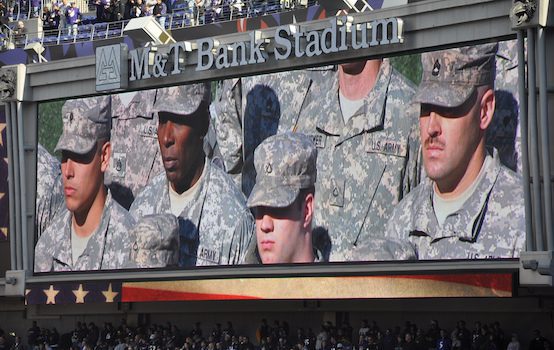On Memorial Day, Getting Beyond ‘Thank You For Your Service’

Thucydides tells us that war changes the meaning of words. Social media demonstrated this maxim several years ago when “mil-splaining” military-related holidays was all the rage. From memes outlining the differences between Veterans, Armed Forces, and Memorial Day, to Fourth of July “safe space” declarations seemingly applied to all vets, the trend was everywhere. Thankfully, it seems now to have passed.
Memorial Day is, of course, for remembering the fallen, those who died in service to the nation. Veterans and their families remember their loved ones in ways they deem appropriate, and the state remembers, too, in a somber, serious manner.
This remembrance should in no way preclude the typical family barbecue and other customs associated with the traditional beginning of summer. National holidays are for remembering and celebrating, not guilt. Shaming those who fail to celebrate a holiday according to one’s expectations is a bit like non-Christians feeling shame for skipping church: it shouldn’t matter because the day means different things to different people. Having a day on the calendar demonstrates the national consensus about honoring sacrifice; anything more than that is a slow walk towards superficiality. President Bush stopped golfing during the Iraq war, but it didn’t stop him from continuing it.
Instead, Memorial Day should engender conversation about our military and the gulf between those who serve and those who don’t. The conversation shouldn’t just be the military talking at civilians; it must be reciprocal. Increasingly civilians see “soldiers as symbols that allow them to feel good about themselves, and the country”—but many also see OxyContin that way. This situation is lamentable because the aforementioned “mil-splaining” could only occur in a country so profoundly divided from its military as to misunderstand basic concepts such as the purpose of holidays. It’s also striking how the most outspoken so-called “patriots” often have little connection to that which they so outlandishly support. Our “thank you for your service” culture is anathema to well-functioning civil-military relations.
The public owes its military more consideration, particularly in how the armed forces are deployed across the globe. Part of this is empathy: stop treating military members as an abstraction, as something that exists only to serve a national or increasingly political purpose. Our Soldiers, Sailors, Airmen, and Marines are deserving of praise and support—especially considering the burden they’ve carried—but what they need more is an engaged public, one that’s even willing to scrutinize the military. Because scrutiny necessitates engagement and hopefully understanding and reform.
But the civil-military divide goes both ways. Military members and veterans owe the public a better relationship as well. This Memorial Day, don’t cringe when someone says “Thank you for your service” and proceed to correct them. Open a dialogue: you might build a real connection. Better yet, volunteer to speak at a school or church: partly to explain your service, sure, but more so to show that military personnel are people, too, not just distant abstractions. Veterans are spread across the county and better able to interact with civilians than our largely cloistered active duty force. They shouldn’t go to schools, churches, and civic organizations for the inevitable praise. They should go to educate, nurture relationships, and chip away at the civil-military divide.
Perhaps by questioning the fundamentals—the “why” instead of the so often discussed “what” in military operations—the public would be in a better position to demand action from a Congress that, heretofore, has largely abdicated serious oversight of foreign policy. Perhaps the public, instead of asking “what” we need to break the stalemate in Afghanistan, could ask “why” there is a stalemate at all—and whether American forces can truly ameliorate the structural, cultural, and historical obstacles to achieving desired ends there.
A strategy is needed that’s rooted in serious analysis of American interests and strengths and a realistic assessment of the world. For nearly a generation, we have failed to align ends, ways, and means. Like “The Weary Titan,” America finds itself unable (or unwilling) to adapt to a changing world. Consumed by domestic strife and the emergence of nationalism, American foreign policy has wandered fecklessly since the end of the Cold War. While we can strike anywhere, this capability is wasted in search of a lasting peace.
What do we have to show for our expenditures? A divided country, financially exhausted while waging war across the globe against an elusive enemy—who is, frankly, not a threat remotely approaching the resources we have aligned against him. Beyond the material costs, there’s the social. Our military has become a syncretic religion, enjoying the support but not due consideration of the nation. This situation is genuinely tragic.
For America to dig its way out of its domestic and foreign troubles it must start with sobering analysis. For the civil-military dialogue, Memorial Day is as good a place to begin as any day. So this weekend, civilians should move beyond “Thank you for your service” and ask a vet about his or her service and lost comrades. Veterans, don’t expect praise and don’t lecture; speak with honesty and empathy, talk about what you’ve done and the conditions you’ve seen. You might be surprised what we can learn from each other.
John Q. Bolton is an Army officer who recently returned from Afghanistan. An Army aviator (AH-64D/E), he is a veteran of Iraq and Afghanistan. He is a 2005 graduate of West Point. The views presented here are his alone and not representative of the U.S. Army, the Department of Defense, or the U.S. government.